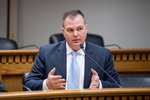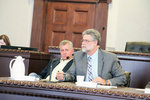

Job creation and property taxes were hot topics during an hour-long telephonic town hall hosted by Sen. John Braun, R-Centralia, and Rep. Ed Orcutt, R-Kalama, on Monday night. The two Republicans from the state Legislature represent Washington’s 20th District. Since they share constituents, the politicians opted to host a joint Town Hall call on Presidents Day.
Both Braun and Orcutt touted the telephone town hall as a practical way to communicate directly with voters from all over the wide-ranging 20th District, which includes portions of Lewis, Cowlitz, Clark and Thurston counties. A moderator noted that “a few hundred people” called in to listen to the town hall and questions were posed from all over the district map.
The subject that was broached most often by taxpayers was property taxes. One question sent in by email sought to understand how, despite the failure of a school bond or levy in a particular district, and no recent upgrades to the sender’s property, their property taxes went up again this year.
Sen. Braun, who is a ranking member on the Ways and Means Committee, noted that prior to this year, property taxes had been declining in Washington for about a decade, and he his hoping to see another decrease soon. Braun, who pointed out that state Democrats recently released a proposal to reduce property taxes, added, “It’s not exactly how I would have done it, but I do appreciate their willingness to work on the issue.”
According to Rep. Orcutt, an assistant member on the finance committee, those property tax talks have enough of a head of steam that property owners should expect a decrease in state property tax beginning next year.
Later in the town hall, Al from Kalama called in to ask about school funding as it relates to property taxes. Braun and Orcutt explained that while local property taxes go toward local school districts, state property taxes are not generally allocated toward education. Rather, public education in Washington is paid for through the sale of natural resources, such as timber from state forests. According to Braun, the state has been failing to generate enough income to properly fund schools.
“There’s lots of pressure from the marbled murrelet and the spotted owl, but we haven't been meeting our harvest goals for 10 years,” said Braun. He says he wants state timberlands to be reevaluated in order to calibrate the most economically productive way to manage those lands and resources.
“This is a problem that we have not been doing well on, frankly, for the last two decades,” said Braun.
If that reworking of forest management is effective, Braun says that it could result in a reduction in property taxes for most Washingtonians as well as an across-the-board increase in public education funding.
“We need to fund our schools, we need to do it properly and we need to do it in a way that is equitable between rural and urban districts,” said Braun. “We’re working toward it, but we’re not quite there yet.”
Orcutt added that many senior citizens are eligible for property tax discounts through government programs and advised citizens to contact their county assessor for specific details.
Looking at the local economy and job market, both Braun and Orcutt doubled down on their support for the proposed Millennium Bulk Terminal in Longview and the methanol plant in Kalama. Those responses were generated by a phone call from “Andy” who wanted to know why the politicians decided to back those projects despite a laundry list of environmental concerns described by opponents.
“I have to support the Millenium Bulk Terminal and the methanol plant in Kalama,” said Orcutt. “We do need the jobs. We’re still not to full employment yet, so we still have people looking for jobs.”
Orcutt, who sits on the Agriculture and Natural Resources Committee, added, “People say coal is bad but the coal that we would be shipping over to China would actually be replacing dirtier coal.”
He insisted that the project would represent a net positive for global air quality.
Braun countered the environmental concerns by playing up the strength of environmental standards covering the projects. He said that the United States has some of the most strict policies in the world, and Washington is one of the strictest states in the union.
“We are not just letting this run wild with environmental destruction without keeping an eye on it,” said Braun, who was adamant that companies should have the right to do business in Washington so long as they follow the rules.
A question about homelessness from “Lisa” in Centralia brought both politicians back around to job creation and the economy again. Lisa wanted to know what the state plans to do about the homeless population epidemic in the region and specifically asked about state-funded affordable housing and referral services for at risk populations.
According to Braun and Orcutt, the creation of more jobs is the best way to help the homeless. Both men stated that government funds should not be used to “buy” vulnerable populations into safer situations. Instead, both Braun and Orcutt reasoned that if they can manage to bring in more industrial and mill-type jobs to the area that more homeless people will be able to buy their own homes.
In another phone call, “Gaeling” from Centralia noted how the recent train derailment over Interstate 5 revealed a glaring lack of alternate routes for travelers heading north and south in western Washington. She wanted to know what the state plans to do about creating, or designating alternate routes in the future.
Orcutt said that he is already in talks with the Department of Transportation about alternative routes.
“We do need to look to see if there are some other more local roads that can be used in incidents like that,” said Orcutt.
“Thomas” from Rochester phoned in to gripe about the fact that the Washington Department of Fish and Wildlife requires a Social Security number in order to attain a fishing license. Thomas noted that he has been a victim of identity theft in the past and expressed his extreme reluctance to hand over such sensitive information for something as trivial as a fishing license.
Braun said that he was unaware of the requirement and promised to look into the matter in order to find a reasonable solution. “I do know that last year we did have the hack on the Fish and Wildlife contractors and many of us had our personal information stolen,” admitted Braun.
In perhaps the most topical discussion, “Arland” from Onalaska called in to find out when, or if, the state government will ever find the political courage to restrict access to, and the sale of, assault weapons like AR-15s.
“When’s the state going to do something about disqualifying the use of assault weapons? We don’t need assault weapons in this state. I mean I’m 69 years old. I’m a two time Vietnam War veteran. I was in the war twice and the only time that weapon is used is to kill people, not to hunt, and I don’t understand how the government allows that to go on in this country,” said Arland. “I can’t get it around my head why the government keeps letting this thing just slide by. It’s like the NRA is in everybody’s pockets.”
Braun was quick to defend the right of American citizens to own weapons and spent time hashing over the difference between automatic and semi-automatic weapons, noting that automatic weapons are already illegal.
“Fundamentally this is a right protected by the constitution,” said Braun, who added that, “We do need to do more to prevent gun violence.” His ideas for accomplishing that task included funding for police, mental health services, and support for high school counselors.
“We need to get after the root cause of this violence,” added Braun.
“Greg” from Kelso was the next caller on the line and he spoke up to back both Braun and Orcutt’s pro-assault weapon stance. Greg noted that he is also a military veteran, although he “missed the war,” and that he collects firearms, particularly old military stock.
“The Second Amendment is not just to hunt. It’s the right to bear arms, and kill people if necessary,” said Greg.
Another life and death matter discussed during the telephonic town hall was the proposal to banish the death penalty in Washington. “Richard” from Tenino expressed his displeasure that the death penalty may be abolished without a vote of the people.
Both Braun and Orcutt noted that they oppose the proposed repeal of the death penalty and noted that since that punishment was put on the books by a public vote, it should only be taken off by a public vote.
Orcutt added that while he believes some changes should be made, such as the number of appeals allowed in death penalty cases, a complete abolition goes too far.
“I think there are some crimes that are just so heinous that the punishment fits the crime,” said Orcutt.
Looking down the road a bit, Braun says that some changes may be in the works on Highway 6 west of Chehalis. “Jeff” from Adna spurred the conversation when he called in to gripe about the condition of the Chehalis River Bridge near I-5, the amount of debris in the river, as well as congestion that has begun to develop near the Scheuber Road and Chilvers Road by the turn off for Seventh Day Adventist Church. Jeff suggested a traffic signal be put in near the busy rural intersection in order to prevent accidents.
Orcutt noted that while the bridge is structurally sound it is functionally obsolete and Braun acknowledged the increasing Highway 6 traffic, calling the traffic signal “a good idea.”
However, both politicians noted that there is little to be done about the debris in the river unless it fits a larger flood mitigation plan.
“The bigger picture is how do we deal with the issue of flooding in the valley in the long term,” said Braun, who noted that the newest capital budget sets aside $60 million for permits and projects related to erosion and other flood issues in the Chehalis Basin.
“We should be positive here. We are making progress even if it does seem like it’s going slow. It’s going faster than the first 90 years of this problem,” said Braun.